Oscar Robertson
The Big O
"He Beat Discrimination with Determination"
"He Beat Discrimination with Determination"
World Movers
Jackie Robinson
Joe Louis
Oscar Robertson
Jesse Owens
Other Jackie Sites
Official Site of Jackie Robinson
TIME Magazine-Jackie Robinson
NY TIMES Sound Bits
AFRO-Americ@: Jackie Robinson
Baseball Hall of Fame
Other Joe Sites
Official Site of Joe Louis
ESPN Sports Century Profile
Boxing Hall of Fame
Detroit RearView Mirror
BoxRec-Fight Record
Other Oscar Sites
Official Site of Oscar Robertson
NBA Profile
Basketball Hall of Fame Profile
Espn Sports Century Profile
Other Jesse Sites
Official Site of Jesse Owens
Espn Sports Century Profile
The Jesse Owens Foundation
Additional Sites
Espn Classic
Jim Crow and Sports
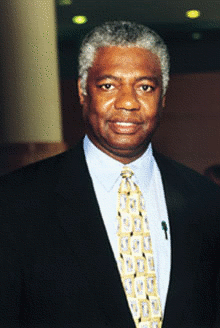
| Biography | Athletic Profile | Achievements | Event That Changed the World |
"The biggest obstacle to your success is you."-Oscar Robertson
Biography
Oscar Robertson was born on November 34, 1938 in Charlotte, Tennessee. At the age of four, his family moved to Indianapolis in search of better opportunities. Unfortunately, they did not know that Indiana had one of the biggest KKK memberships in the nation. Racism became and everyday part of their lives as they had to avoid most areas of town. Oscar grew up playing basketball with a bunch of rolled up socks and a tree branch until the age of eleven. He spent the majority of his time at school, church, or playing basketball and listening to boxers like Joe Louis. He grew up idolizing his brother Bailey. During the summer or after schools the kids in his neighborhood would play at a court located at one of the first housing projects in Indianapolis. The dustbowl as they called it had a few simple rules, if you win you keep playing, if you lose you keep watching. These rules kept games competitive and allowed the older guys to dominate the court. The neighborhood they called Naptown was filled with underprivileged kids who enjoyed playing basketball. Oscar would go to the courts to watch the games every second he could. He started memorizing players� tendencies and learned how to manage a game. He got more opportunities to play than most of his friends because of his size. There is no question the Dust Bowl was home to some of the best basketball ever played in the state of Indiana, it is too bad nobody else knew about it.
In the center of Naptown was Crispus Attucks High, named after the African American who was shot in the Boston Massacre. Coach Ray Crowe provided the guidance for a young and talented Oscar. Oscar started on the varsity team for three years. He played virtually every position and excelled. The peak of his career may have been the 45 game wining streak that he helped create with his teammates from 1955-1956 on the Crispus Attucks teams. The results two state championships and they were the first all-black national championship team. His performances earned him the title of Mr. Basketball Indiana, in 1956 and a two-time stint as a High School All-American. Oscar was destined for bigger and better things but he always remembered life in the Dust Bowl. He also wonders if times were different could have his big brother Flap experienced the achievements he would accomplish in the next two decades.
Oscar was highly recruited out of high school and wound up going to Cincinnati where he would become the first African-American to so on a basketball scholarship. Due to eligibility rules that have since been changed,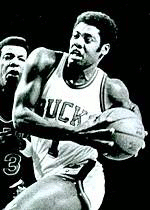 Oscar could not play his freshman season. The seasons he did play however, were quite remarkable. He lead the Bearcats to two final four appearances and let the team in scoring, rebounding, free throw percentage three years, and assists as a junior and senior. He was the first player to lead the nation in scoring for 3 years and was the first 3-time National College Player of the Year. He set 14 NCAA scoring records and was a three time All-American. Only �Pistol� Pete was able to put up more points in a three-year span. With all Oscar had accomplished he still was not allowed to sleep in the same hotel or eat in the same restaurants as his teammates. With averages like 33.8 points and 15.2 rebounds per a game through out his collegian career it is hard to believe he was treated so poorly.
Oscar could not play his freshman season. The seasons he did play however, were quite remarkable. He lead the Bearcats to two final four appearances and let the team in scoring, rebounding, free throw percentage three years, and assists as a junior and senior. He was the first player to lead the nation in scoring for 3 years and was the first 3-time National College Player of the Year. He set 14 NCAA scoring records and was a three time All-American. Only �Pistol� Pete was able to put up more points in a three-year span. With all Oscar had accomplished he still was not allowed to sleep in the same hotel or eat in the same restaurants as his teammates. With averages like 33.8 points and 15.2 rebounds per a game through out his collegian career it is hard to believe he was treated so poorly.
Even with the treatment, he was treated with inside his nation he was still willing to put off a pro career in order to play for USA Basketball. He co-captained the undefeated team with his soon to be NBA rival Jerry West. The experience was a learning one for Oscar. He matured throughout the games and was now ready to enter the NBA.
When Oscar Robertson entered the NBA as the first overall selection of the Cincinnati Royals in 1960 nobody knew just what to expect. By the end of his career, his none flashy style landed him as the greatest player to have ever played the game. He achieved almost anything a point guard could. He led the league in assist six times and retired as the all-time assist leader, he is currently third in an era where an assist is scored much easier then it was in the 1960�s and 70�s. He is the sole member of the 800/800 club with 985 rebounds and 899 assist in just his second year in the league. He also is the only man to ever average a triple double throughout the course of a season. A feat he accomplished in that very same season. Over the first 5 years of his career, he accumulated the same types of averages with 30.8 points, 11.4 assists, and 12.5 rebounds per game. He was rookie of the year in 1961 and a 12-time all-star. He was the MVP in 1964 and was a nine-time 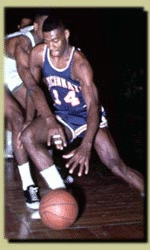 All-NBA First Team selection. He led teams to ten NBA playoffs and capped off his career in 1971 with an NBA Championship in Milwaukee. The argument can be made that Jordan was more clutch, had a better three point shot, and was more explosive, but anyone can easily look at the numbers to see the Big O was the better all around player. He grew up in an era without the three-point line and with a belief system that the benefit of the team must be placed in front of his own selfishness. The fact that he shot 48.5% from the field is a tribute to his ability to play within a system. He seems to be the most forgotten player in NBA history when in truth his on and off the courts achievements may have been the most spectacular of anyone to put on an NBA jersey. Both of his jerseys are hanging high above the rafters and retired in the Bradley Center (His #1 with the bucks) and Arco Arena (His #14 with the Royals, now renamed the Kings)
All-NBA First Team selection. He led teams to ten NBA playoffs and capped off his career in 1971 with an NBA Championship in Milwaukee. The argument can be made that Jordan was more clutch, had a better three point shot, and was more explosive, but anyone can easily look at the numbers to see the Big O was the better all around player. He grew up in an era without the three-point line and with a belief system that the benefit of the team must be placed in front of his own selfishness. The fact that he shot 48.5% from the field is a tribute to his ability to play within a system. He seems to be the most forgotten player in NBA history when in truth his on and off the courts achievements may have been the most spectacular of anyone to put on an NBA jersey. Both of his jerseys are hanging high above the rafters and retired in the Bradley Center (His #1 with the bucks) and Arco Arena (His #14 with the Royals, now renamed the Kings)
As for his accomplishments off the court, one needs to look no further than the Oscar Robertson Suit. He filed it as President of the players union in 1970. It was finally settled in 1976 and set the foundation for free agency in the NBA. He changed the way basketball was played by being the first big point guard and he was a leader that changed the way the business side of the game was dealt with by instituting free agency.
Away from the court, Oscar now runs businesses and consults his former school the University of Cincinnati. Through out his career he contributed everything he had to making the best life he could possibly have. In a sport where racism can determine the outcome of the game he and his teammates were determined to not let it.
Back to Top
Professional Profile
| G | FG% | FT% | Rebs | RPG | Asts | APG | Pts | PPG |
| 1,040 | .485 | .838 | 7804 | 7.5 | 9,887 | 9.5 | 26,710 | 25.7 |
|
Full Name: Oscar Palmer Robertson Born: 11/24/38in Charlotte, Tenn. High School: Crispus Attucks (Indianapolis) College: Cincinnati Drafted: Cincinnati Royals, 1960 (first overall) Transactions: Traded to Milwaukee, 4/21/70 Height: 6-5 Weight: 220 lbs. | 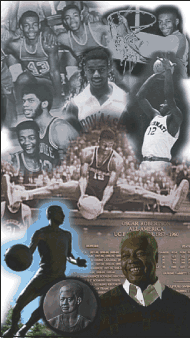 |
Back to Top
Achievements
NBA Achievements All-NBA First Team 9 Times | 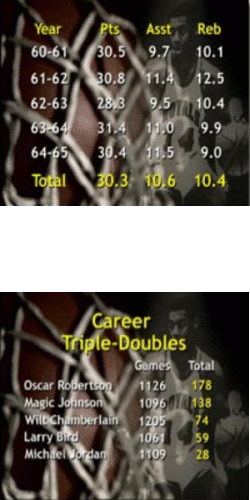 ~Missouri Valley League Champions 1958, 1959, 1960 ~NCAA Tournament Appearances 1958, 1959, 1960 ~NCAA Regional Champions 1959, 1960 ~NCAA Final Four 1959, 1960 ~Three-year record 79-9 ~Co-Captain 1959, 1960 ~18 U.C. records ~First player to be a Three Time NCAA Player of the Year ~First player to ever win Three NCAA Scoring Titles ~Jersey #12 retired |
Back to Top
The Event That Changed The World:Crispus Attucks 1955 High School State Championship Team
In 1954, high school athletics hit a new high in the state of Indiana. The small town, Milan Indians (Male enrollement: 64) won the state title five decades before the class system was introduced to the state. The feat was so spectacular that they portrayed the �Milan Miracle� years later in the movie Hoosiers. Hoosiers is an everlasting reminder of the small town team�s achievements. Unfortunately, the movie ends in 1954, just one year before the compelling story of future 12-time NBA all-star, Oscar Robertson and his Crispus Attucks 1955 championship team.
The 1955 Crispus Attucks run was historic. Their school did not have a gym so their home games were played at Butler Field House, their equipment was lousy, and their chances slim. They became the first all-black team to win a state championship in the country. Six foot five inch guard Oscar Robertson was their leader on the floor. He possessed a court vision unlike anyone who had played the game up to that time. He could score, rebound, and pass extremely well. Off the floor, their coach, Ray Crowe, taught his players how to deal with racism in a classy way. During their championship run, they lost only one game. 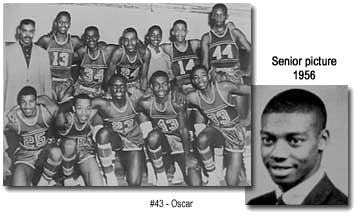 It came on the 17th game of the season. They were up one with just seconds left when their opponent's guard dribbled directly out of bounds in front of the official and laid the ball in for the winning basket. Forward Willie Merriweather learned a valuable lesson that day as he recalls the situation by saying, �The focus should be on what happened next.� Coach Crowe did not complain or yell; instead, he loaded his team onto their bus and held a four-hour practice the next day. The message to his team was simple, if things did not go right, as a team you just have to overcome them. Coach Crowe never fought racism, instead he used it as fuel for his team, their five on seven attitude took them to a higher level. Most importantly, coach Crowe was always helping his players out by slipping them money for lunch or giving them an extra pair of socks. In return, his players resembled their coach; they were classy just like he was. The team went 31 and 1 that year. After winning the state championship, they returned to their racist hometown. The mayor of Indianapolis changed the team�s victory parade route to the black neighborhood because he was afraid the black fans would cause problems downtown. Racism followed the team wherever they went, yet through there determination they overcame it by putting up with it. Opportunity through basketball presented itself and the majority of the players were able to grasp it by going on to play at the college level.
It came on the 17th game of the season. They were up one with just seconds left when their opponent's guard dribbled directly out of bounds in front of the official and laid the ball in for the winning basket. Forward Willie Merriweather learned a valuable lesson that day as he recalls the situation by saying, �The focus should be on what happened next.� Coach Crowe did not complain or yell; instead, he loaded his team onto their bus and held a four-hour practice the next day. The message to his team was simple, if things did not go right, as a team you just have to overcome them. Coach Crowe never fought racism, instead he used it as fuel for his team, their five on seven attitude took them to a higher level. Most importantly, coach Crowe was always helping his players out by slipping them money for lunch or giving them an extra pair of socks. In return, his players resembled their coach; they were classy just like he was. The team went 31 and 1 that year. After winning the state championship, they returned to their racist hometown. The mayor of Indianapolis changed the team�s victory parade route to the black neighborhood because he was afraid the black fans would cause problems downtown. Racism followed the team wherever they went, yet through there determination they overcame it by putting up with it. Opportunity through basketball presented itself and the majority of the players were able to grasp it by going on to play at the college level.
They would repeat again a year later without losing any games. Some didn�t have proper clothing, shelter, or food but yet all were united. It is amazing when you think of the implications that sports can have on society. For 20 plus games a season a small black community in the heart of Indianapolis lived on their every shot, pass, and dribble. Racism never can be erased from the memories of those who have experienced it. Instead, it can only be fought by their courage and determination to remember the finer points of their young lives.
Role camera, it�s not coach Dale driving off in the rural highway, driving past cornfields. In reality, it is coach Crowe being forced to sit in the back of the bus and he looks out the window only to see row after row of poorly kept housing projects. Meanwhile for guys like Oscar he�s taking a train ride to Cincinnati, grateful at the opportunity coach Crowe gave him, grateful to be out of Indianapolis, and most importantly grateful that he was about to suit up for the Bearcats.
Back to Top